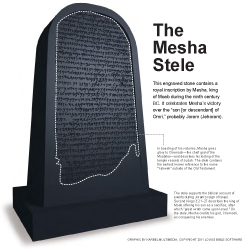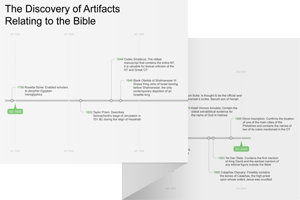57:1 The righteous one perishes Surrounded by wickedness, the few remaining righteous people would welcome death as a merciful release. These verses invert the stereotypical understanding that death is a punishment or judgment for wickedness. In evil times, death is a reward for the righteous.
57:3 offspring of an adulterer Refers to illegitimate children born out of an immoral union. In Jesus’ day, the Jewish religious leaders protest that they are not children of immorality (see John 8:41).
57:4 offspring of deception Echoes the accusation that Israelites are corrupt and rebellious children (see Isa 1:4).
57:5 among the oaks A site of idolatrous worship; see note on 1:29.
who slaughter children Child sacrifice appears to have been one of the idolatrous practices of the Canaanites. Ezekiel also accuses Israel of participating in these sacrifices (see Ezek 16:20–21).
57:6 the smooth stones of the valley Refers to the smooth stones found at the bottom of a dry riverbed or wadi. The Hebrew term that denotes a valley technically refers to either the seasonal torrent of water or the channel that contains it, even during the dry season.
57:7 a high and lofty mountain Ancients believed the gods lived on high mountains, so shrines to worship the various gods of the Canaanites were often set up on hills and mountains.
57:8 behind the door and the doorpost The Israelites were supposed to have memorials on their doorposts to remind them of Yahweh’s Law and their responsibility to pass on the teaching to their children (see Deut 6:9). Instead, they have set up memorials for their idols.
you depart from me, and you go up; you make your bed wide Israel is depicted as an unfaithful wife—a common prophetic motif (see Ezek 16:24–25).
you have seen their genitals The Hebrew phrase here reads “looked on a hand.” The Hebrew word for “hand” (yad) is a euphemism for male genitalia.
for male genitalia.
57:10 You found the renewal of your strength Echoes Isa 40:31. Here, the Hebrew term yad (“hand”) represents “strength” (see note on v. 8). The concept of “virility” embodies both figurative senses for yad.
57:11 and did not remember me Throughout the book of Deuteronomy, Moses appealed to Israel to “remember” Yahweh and His mighty acts by which He saved them from Egypt. The appeal is made 15 times in Deuteronomy (e.g., Deut 5:15; 32:7). Yahweh asks why they did not remember, when it was so strongly emphasized that they must.
57:14 build up! Clear the way Echoes Isa 40:3.
57:15 the high and lofty one Echoes the vision of God in 6:1, and the exaltation of the Servant in 52:13.
I reside in a high and holy place Yahweh’s dwelling place is commonly associated with height. The Canaanite deities El and Baal are also associated with holy mountains (see note on 2:2).
the contrite and humble of spirit While God’s dwelling is high and separate, His presence can still be found among the humble (compare Psa 138:6). See Isa 55:8 and note.
57:16 the breaths Yahweh’s unending wrath would extinguish all life that He had created; His anger is temporary (see 1 Pet 5:10; compare Gen 2:7).
57:17 his sin of gain The leaders of Israel sinned by seeking their own gain (see Isa 56:11; Jer 6:13).
57:18 I have seen his ways Contrasts with God’s ways—which they should have been following (see Isa 2:3).
57:21 There is no peace See the earlier occurrence of this phrase in 48:22. Here the wicked are unable to respond to the offer of peace.

|
About Faithlife Study BibleFaithlife Study Bible (FSB) is your guide to the ancient world of the Old and New Testaments, with study notes and articles that draw from a wide range of academic research. FSB helps you learn how to think about interpretation methods and issues so that you can gain a deeper understanding of the text. |
| Copyright |
Copyright 2012 Logos Bible Software. |
| Support Info | fsb |
 Loading…
Loading…


